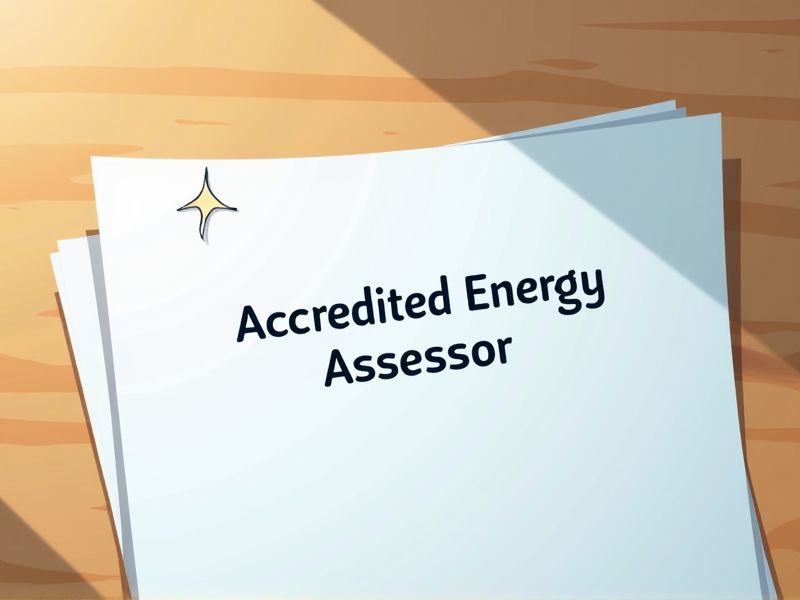
Accredited Energy Assessors play a crucial role in evaluating energy efficiency in buildings, which directly impacts energy conservation and cost savings. Organizations and regulatory bodies require standardized practices to ensure consistent and accurate energy assessments, necessitating specific certifications. These certifications validate an assessor's knowledge of building systems, energy codes, and sustainable practices, fostering trust and credibility in their evaluations. Key certifications essential for becoming an Accredited Energy Assessor include the following.
Accredited Energy Assessor Certification
Accredited Energy Assessor Certification is essential for ensuring assessors have the necessary knowledge and skills to evaluate energy efficiency effectively. Standards and regulatory requirements demand assessors to be certified, guaranteeing the accuracy and reliability of energy assessments. Certification enhances the credibility of assessors, building trust among clients and stakeholders. Providing structured training and education, it ensures assessors stay updated with industry developments and technological advancements.
Certified Energy Manager (CEM)
The need for a Certified Energy Manager (CEM) in the role of an Accredited Energy Assessor arises from the increasing complexity of energy systems and the demand for specialized knowledge to identify efficiency improvements. When a CEM conducts energy assessments, it can lead to better-informed decisions, reducing energy wastage and cutting costs significantly. The expertise of a CEM also ensures compliance with energy regulations and standards, thereby minimizing risks of legal issues for organizations. Having a CEM on board enhances credibility and provides assurance to stakeholders about the commitment to sustainable energy practices.
Certified Energy Auditor (CEA)
Accreditation bodies recognize the Certified Energy Auditor (CEA) certification, enhancing credibility and trust in energy assessments. CEAs possess a comprehensive understanding of energy systems, enabling accurate identification of inefficiencies. They provide actionable insights that help organizations reduce energy consumption and costs. Regulatory compliance often mandates assessments by certified professionals, making CEAs essential for such evaluations.
HERS Rater Certification
Possessing a HERS Rater Certification is vital for an Accredited Energy Assessor as it provides in-depth knowledge of energy efficiency standards essential for evaluating residential energy performance. The certification ensures the assessor can accurately rate and analyze a home's energy systems, leading to more precise energy recommendations. This proficiency supports compliance with energy codes and standards, which can be pivotal in reducing homeowner energy costs and environmental impact. Without this certification, assessors might lack the critical skills required to deliver reliable and verified results in energy assessments.
LEED Accredited Professional (LEED AP)
Having a LEED Accredited Professional (LEED AP) designation equips an energy assessor with a robust understanding of green building practices, which facilitates accurate energy assessments. This certification enhances the credibility of the assessor, making them more competitive in the market for jobs related to sustainable design. LEED AP holders are also more adept at identifying potential energy savings by integrating sustainability principles throughout the assessment process. Furthermore, understanding LEED frameworks allows assessors to provide valuable insights on achieving LEED certification for building projects, aligning assessment outcomes with sustainable goals.
BREEAM Assessor Certification
BREEAM Assessor Certification provides the necessary credibility for energy assessors to conduct comprehensive evaluations of building sustainability. It ensures assessors are knowledgeable about global best practices in environmental performance. The certification enhances an assessor's ability to guide construction projects towards higher efficiency standards. Builders and developers prefer certified professionals to meet legal and regulatory sustainability requirements.
ASHRAE Energy Auditor Certification
The ASHRAE Energy Auditor Certification enhances an Accredited Energy Assessor's ability to perform energy audits with standardized methods. It signals to clients and employers that the assessor is proficient in identifying energy-saving opportunities while complying with industry standards. Through certification, assessors demonstrate a commitment to professionalism and continued learning in the rapidly evolving energy sector. Certified auditors are more likely to be trusted for large-scale projects, improving career prospects and credibility.
Building Performance Institute (BPI) Building Analyst Certification
BPI Building Analyst Certification enhances an energy assessor's credibility by ensuring they possess the necessary skills and knowledge for effective energy auditing. This certification provides standardized training, leading to higher quality assessments and increased trust from clients. It equips assessors with the ability to identify energy inefficiencies accurately, which can result in improved energy conservation strategies. Having this certification can lead to better job opportunities and higher earning potential in the growing field of energy assessment.
NABERS Assessor Certification
Achieving NABERS Assessor Certification equips an energy assessor with the necessary skills and knowledge to evaluate building energy performance accurately. It is a recognized standard that ensures assessors can provide reliable ratings that clients and stakeholders trust for environmental performance benchmarks. Possessing the certification can enhance an assessor's credibility and professional opportunities within the industry. Certified assessors contribute to sustainable practices by supporting businesses in reducing energy consumption based on accurate assessments.
ISO 50001 Energy Management Certification
ISO 50001 certification helps an Accredited Energy Assessor demonstrate standardized and efficient energy management practices. This certification can lead to reduced energy consumption and operational costs for organizations. Adoption of ISO 50001 increases credibility and trust among clients who prioritize sustainability. Energy assessors with this certification can drive better compliance with regulatory requirements and international best practices.
Summary
When you obtain certifications as an Accredited Energy Assessor, your professional credibility increases significantly. This enhanced trust can lead to more client engagement and diverse project opportunities. Clients will likely perceive your services as reliable and in compliance with industry standards. Achieving such certifications may result in higher demand for your expertise and potentially boost your career growth.
